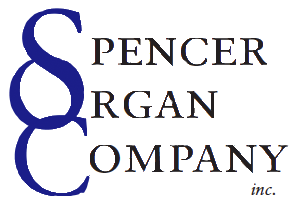Sustainability
Spencer Organ Company, Inc. is committed to doing business in a different way. Rather than just focusing on our bottom financial line, we are working towards a triple bottom line by adding the welfare of people and planet to the traditional bottom line of profit. We are continually seeking to improve the environmental sustainability of our operations and always have an eye toward those affected by our work – employees, clients, vendors and surrounding communities. We are also expanding the scope of our impact beyond our particular company to the policy level with advocacy on various sustainability issues.
Physical Operations
Solar panels on our facility’s roof
For the past few years we have been working to reduce our environmental impact of our physical operations. In 2010 an 11-kilowatt photovoltaic system was installed on the roof of our shop facility, which provides half of our electricity needs. We have also been working to reduce the environmental footprint of our shop by switching to more efficient compact fluorescent lighting and other efficiency measures. We’ve increased the fuel efficiency of our vehicle fleet with a Dodge Sprinter van (average 25 mpg), a Ford Escape Hybrid (average 28 mpg), a Toyota Prius Hybrid (average 45 mpg) and an all electric Chevy Bolt. We are seeking ways to reduce the toxicity of materials we use, use recycled materials whenever possible and follow safe disposal practices for all hazardous materials. Wherever possible, we reduce, reuse and recycle.
In 2012 we went through the green certification Sustainable Business Leader Program. This sustainability audit and certification program helped us to identify over 40 areas for improvement and a sustainability action plan to implement them. Not only have our sustainability efforts helped our company to run better, but have also saved us considerable money.
Social Impact
In addition to our commitment to reducing our environmental footprint, we offer a livable wage to our employees and a benefits package that includes health care, a socially responsible retirement plan and vacation time. We strive to be a voice for social equity in our larger community. SOC president Joseph Rotella has testified at the State Capitol a number of times and participated in advocacy events in Washington, D.C., on a number of issues including fairness in taxation and raising the minimum wage. He has participated in events organized by both Businesses for Shared Prosperity and the American Sustainable Business Council.
In 2010 we started a garden in the parking lot at our shop facility that provides some fresh produce throughout the summer months.
Local Economies
Spencer Organ Company, Inc. strongly believes in the importance of relocalization of our economies and has been an active participant in the local economies movement. President Joseph Rotella has served on the advisory board of the Sustainable Business Network of Massachusetts since 2011.
In 2013, Spencer Organ Company, Inc. played a lead role in the founding of Waltham Local First – an association of independently and locally owned businesses in Waltham. Our purpose is to contribute to a strong local economy and vibrant community by educating the public about the value of shopping locally.
Whenever possible, we purchase supplies from local and independently owned establishments. We are a proud patron of our local hardware store: Ace Hardware in Newton.
Climate Action Business Association
Realizing the civilization-changing nature of climate change, Spencer Organ Company, Inc. joined the Climate Action Liaison Coalition (CALC) in Spring 2013. For over a year, we hired a part-time employee as a Climate Action Liaison (CAL).
CALC has now become CABA, the Climate Action Business Association. Recognizing the strong and unique voice small businesses have in the media and in policy arenas, we are building a small-business voice for bold and responsible action on climate change. In addition to advocacy, member businesses strive to reduce the carbon emissions of their internal operation and also work within the local communities of which they are a part to build resilience. Our aim is both to mitigate the worst effects of climate change that we can avoid and to adapt to the climate changes we cannot avoid with as much preparation and grace as possible.

